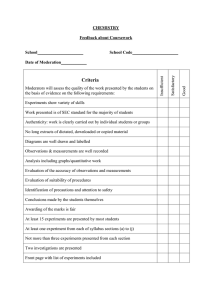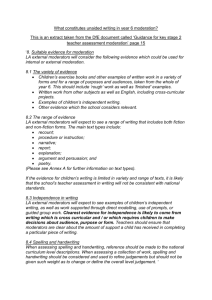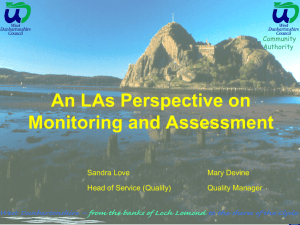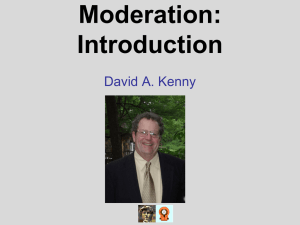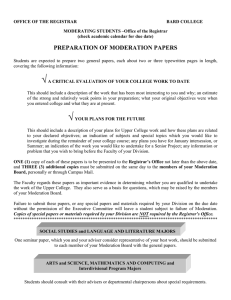KS1 Teacher assessment moderation: LA requirements
advertisement
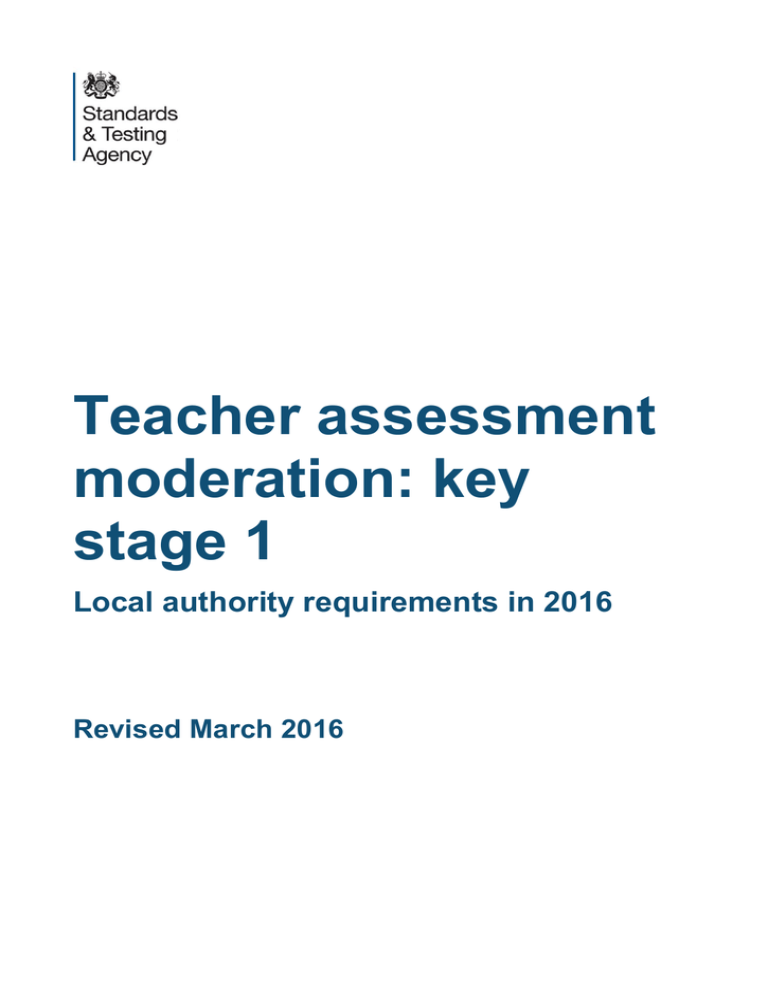
Teacher assessment moderation: key stage 1 Local authority requirements in 2016 Revised March 2016 Updated version March 2016 Updates reflect the information contained in Clarification: key stage 1 and 2 teacher assessment and moderation guidance, published on 8 March 2016, at www.gov.uk/sta. If you are already familiar with this guidance, you do not need to re-read it but should refer to the updated sections below: Introduction and clarification about the external moderation process: page 3 Change of dates for TA moderation and submission of TA data: pages 7, 8,13 Clarification about providing evidence before an external moderation visit: page 9 Clarification of evidence required to support TA judgements: page 10 Agreed sign off of the external moderation visit: page 12 Clarification of appeals process: page 13 Contents Introduction 3 The external moderation process 3 Essential requirements for local authorities 5 Moderation plan 5 Recruitment and quality assurance of the LA external moderation team 6 Moderation visits 7 Preparing for moderation visits 8 Selecting the sample of pupils for moderation 9 Requirements for moderation visits 10 Agreed sign off of the external moderation visit 12 Data submission 13 Appeals 13 2 Introduction If you are responsible for key stage 1 (KS1) teacher assessment (TA) within your local authority (LA), you must comply with this guidance to ensure that moderation processes provide valid and accurate TA judgements. It must be used in conjunction with the 2016 KS1 ‘Assessment and reporting arrangements’. KS1 TA will form part of schools’ published accountability data. Schools must ensure that it is robust and credible. External moderation is statutory and confirms that TA judgements for KS1 are accurate and consistent with national standards. We have produced additional guidance about the TA moderation process for schools with pupils at the end of KS1. The external moderation process LA external moderation is a supportive process, with the LA moderator reviewing the work of a sample of pupils from the cohort and then holding a professional dialogue with teachers to confirm that TA standards are being applied appropriately. As a result of this process, LAs may require schools to amend teacher judgements for individual pupils if it is determined that judgements are not in line with national standards. External moderation is designed to ascertain whether schools are assessing to the correct standard. It may be that there are pupils who have not met a small number of the 'pupil can' statements, or the LA does not consider the evidence presented to be sufficient, such that the pupils have not been awarded a particular standard. If the school believes that these pupils will acquire the relevant knowledge or skills after the moderation visit, but before the deadline for TA submission of 30 June, the LA can agree to re-moderate the pupils. The professional dialogue between the year 2 teachers and the LA external moderator is essential. This allows the teacher to talk through their judgements using the necessary evidence to support their TA. To judge that a pupil has met one of the standards within the interim TA frameworks, the LA external moderator must scrutinise the evidence presented and validate each judgement within the sample. Evidence will consist of: examples of pupils’ work statutory KS1 tests teachers’ knowledge of their pupils. 3 The evidence must show that the pupil demonstrates attainment of all of the ‘pupil can’ statements within the standard they have been awarded. The teacher must be confident that the pupil meets the ‘pupil can’ statements in the preceding standards, but there is no requirement to produce specific evidence for them. It is likely that the pupil’s work for the standard they have been awarded will also evidence the ‘pupil can’ statements of the preceding standard(s). If teachers are confident in their judgements, they do not need to refer to the exemplification materials. Schools may wish to use the exemplification materials as guidance to support teachers in making their own TA judgements and to validate judgements across the school. LAs may refer to the exemplification materials if guidance is required when undertaking an external moderation visit. There is no requirement to provide ‘tick sheets’ for an LA external moderation visit. 4 Essential requirements for local authorities These tables set out requirements for LA moderation to help them plan and carry out their statutory moderation duties. Moderation plan LAs must plan an annual programme to ensure their statutory duties in relation to the moderation of KS1 TA are met. Key stage 1 reading, writing & mathematics – essential requirements The Standards and Testing Agency (STA) requires LAs to have a plan for the external moderation of KS1 reading, writing and mathematics. LAs must provide details to STA, via an STA online survey, of the main contact details for the moderation team and, specifically, an accountable LA officer who has strategic responsibility for the planning and implementation of KS1 moderation. LAs must address, within 2016 planning, any relevant concerns that arose from STA’s 2015 external moderation process. LAs should communicate details of the moderation process to all relevant stakeholders including: LA colleagues, including the data team headteachers teachers. LAs must have a specific moderation appeals procedure. 5 Recruitment and quality assurance of the LA external moderation team To ensure LAs carry out consistent and accurate moderation of judgements against the standards within the interim TA frameworks, they must recruit a moderation team with appropriate and recent experience of key stage 1. LAs must also quality assure and train moderators so that external moderation is delivered consistently. Key stage 1 reading, writing & mathematics – essential requirements LAs must have an effective process for the recruitment of LA external moderators. All LA external moderators must be qualified teachers with recent and relevant experience of KS1 assessment and moderation. They must be able to demonstrate consistently their ability to: review evidence objectively against the standards within the interim TA frameworks provide accurate written and verbal feedback. LAs must provide an effective moderator training programme, which refers to the interim TA frameworks, to ensure validity and reliability of the moderation process. As part of the LA external moderators’ induction, LAs must make sure that newly appointed moderators have access to a mentor and provide opportunities to shadow visits as early as possible in the moderation window. LAs must make sure that quality assurance of each LA external moderator is carried out to ensure consistent and effective practice. 6 Moderation visits Key stage 1 reading, writing & mathematics – essential requirements LAs must moderate a minimum of 25% of schools within their area. STA will select a number of schools for moderation which must be included in the LA’s moderation arrangements. Details of any schools selected by STA will be sent to LAs shortly. LAs must also include schools for moderation based on their own local intelligence to ensure that they externally moderate 25% of their schools. Triggers for external moderation may include: new teaching staff new senior leadership team Ofsted concern historical data concern date of last external moderation other local concern. Schools must only be notified on or after 20 May 2016 that they will receive a moderation visit. LA external moderation visits can take place from 23 May 2016 and must be completed by 30 June 2016. 7 Preparing for moderation visits LAs must ensure that all schools are aware of external moderation processes. Visits must be arranged and pupils selected in line with STA’s requirements. Key stage 1 reading, writing & mathematics – essential requirements LAs must ensure that external moderators do not visit schools with which they have a potential or perceived conflict of interest. For example, LA external moderators who are serving teachers should not visit schools in their immediate vicinity. Similarly, LA external moderators should not visit schools where they have recently provided support or intervention activities, such as those designed to raise pupil attainment. LAs must maintain an accurate record of historical external moderation visits including the reasons for each visit. LAs must provide consistent and proactive communications to schools regarding moderation arrangements. LAs must notify schools of an external moderation visit only on or after 20 May 2016. 8 Selecting the sample of pupils for moderation LAs must select the sample of pupils for moderation. Key stage 1 reading, writing & mathematics – essential requirements LAs must notify schools of the chosen pupils in the sample either on the day of the visit or, at the earliest, the day before. Please note there is no requirement from STA for schools to submit TA judgements to their LA in advance of any external moderation visit. The exact number of pupils discussed during the external moderation visit will vary, depending on the school’s size and circumstances. Final sample selection must rest with the LA external moderator. The LA external moderator must select a minimum sample of 10% across the cohort for each subject, or in the case of a single class, a minimum of 3 pupils. Different pupils must be selected for each subject; reading, writing and mathematics. The sample must cover the full range of attainment within the cohort. 9 Requirements for moderation visits Key stage 1 reading, writing & mathematics – essential requirements Visits must take place at an agreed time within the school day. There is no expectation that school staff will need to be released for the entirety of the visit. The LA external moderator must review evidence produced during day-to-day teaching in year 2 for each selected pupil against each of the ‘pupil can’ statements within the standard awarded from the interim TA framework. Moderators must be assured that, through the review of evidence and professional dialogue, any preceding standards have also been met. There is no requirement for teachers to provide additional information on statements from any preceding standards. If there is insufficient evidence to support teachers’ judgements, the LA external moderator must request to see other examples and potentially expand the sample. LA external moderators must be satisfied that the work was completed independently. Specific advice on independent work for writing: if writing evidence has been redrafted by the pupil, this is acceptable as independent work. The redrafted work may be in response to self, peer or group evaluation, or after discussion with the teacher pupils can also independently use classroom resources, such as dictionaries it would not be independent if the work was modelled or heavily scaffolded, copied or paraphrased, or where the teacher has directed the pupil to change specific words or punctuation. Specific advice on evidence for reading: LA external moderators can request to hear pupils read if it is agreed as part of the professional dialogue with the teacher. LA external moderators must request to see the pupils’ scripts and results from the statutory tests to identify how they have been used to inform the school’s TA judgements. LA external moderators should be aware that some schools will have completed the KS1 tests in 1 subject early to support STA in setting standards. Schools may wish to provide evidence to show how a pupil has progressed since the test was administered to demonstrate how particular statements have now been met. 10 Where the LA external moderator judges that there is insufficient evidence for the standard awarded, they must detail, within the visit note, the revised judgement and the reason for it. If the moderator is unable to validate judgements due to a systematic lack of evidence, they must refer the school to the STA maladministration team. Where moderation takes place at a venue other than the school, all of the essential requirements apply. 11 Agreed sign off of the external moderation visit The LA external moderator must provide written confirmation of the outcome of the moderation visit to the school. This will confirm whether the school’s TA judgements are considered to be consistent with the standards within the interim TA frameworks. Key stage 1 reading, writing & mathematics – essential requirements The LA external moderator must provide the school with a completed LA record of the visit, which includes: the pre-validated TA data set the agreed validated judgements any pupils for whom the LA agrees to consider further evidence and re-moderate any decisions that the school intends to appeal any concerns that require further action by the school or LA The LA external moderator must ensure that the record of the visit is signed by the headteacher (or delegate) and LA external moderator. 12 Data submission LAs are required to have a process to analyse submitted TA data to check that it matches external moderation decisions and that all schools have submitted accurate TA data by 30 June 2016. Key stage 1 reading, writing, mathematics & science – essential requirements All schools must submit accurate TA data to their LA by 30 June 2016. A school must only re-submit data after 30 June 2016 when required to do so by STA or the LA. LAs must have a defined data validation process using local intelligence to investigate any unexpected pattern of attainment for any school. Close links should be maintained between the moderation team and the data team within the LA. This will aid the data validation process. Appeals LAs are required to have an appeals process and share it with their schools. Key stage 1 reading, writing & mathematics – essential requirements Schools must be aware of the LA’s appeals process before the LA moderation visit. LA external moderators must refer to the LA’s appeals process during the moderation visit. Schools must have evidence to support any appeal before the appeal is processed. The appeal can only be based on evidence shown to the LA external moderator during the LA moderation visit. 13 © Crown copyright 2016 This publication (not including logos) is licensed under the terms of the Open Government Licence v3.0 except where otherwise stated. Where we have identified any third party copyright information you will need to obtain permission from the copyright holders concerned. To view this licence: visit www.nationalarchives.gov.uk/doc/open-government-licence/version/3 email psi@nationalarchives.gsi.gov.uk write to Information Policy Team, The National Archives, Kew, London, TW9 4DU About this publication: enquiries www.education.gov.uk/contactus download www.gov.uk/government/publications Reference: STA/16/7604/e Follow us on Twitter: @educationgovuk ISBN: 978-1-78644-188-1 Like us on Facebook: facebook.com/educationgovuk
